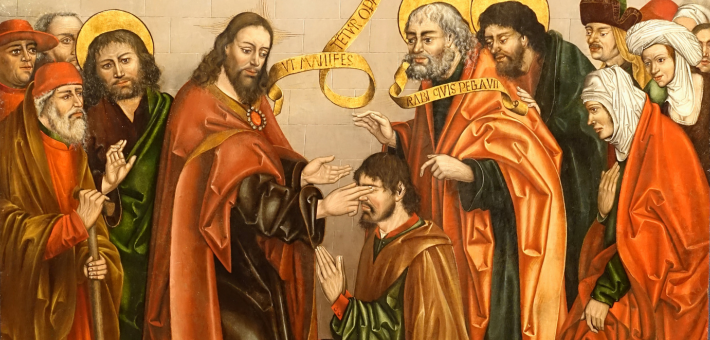Commentary on Hebrews 7:23-28
The lectionary texts from Hebrews for the previous week, this week, and the coming two weeks revolve around the identity of Jesus as the great high priest, the manner of his priestly service, and the outcome of his service. The author expands on these topics throughout the middle of the writing (Hebrews 5:1–10:18), a section marked off by verbally and grammatically similar passages (4:14–16; 10:19–25).
Hebrews 7:23–28 returns to ideas first introduced in last week’s lectionary text, Hebrews 5:1–10. In that earlier passage, the author argues from the general to the specific: from the regulations related to the appointment and vocation of “every” high priest to the specific ways Jesus fulfills this role. It is important to recall what the author has said about the high priest’s responsibility for offering sacrifices and dealing gently with the wayward (5:1–3) and, especially, what he has said about God’s initiative in calling and appointing each high priest (5:4–6).
For the broader argument of Hebrews, it is central that Jesus “did not glorify himself in becoming a high priest” but, rather, “was appointed” by God’s speech (5:5–6). The author applies Psalm 110:4 to Jesus, arguing that through God’s speech, Jesus has been appointed a “priest forever according to the order of Melchizedek” (5:6). In Hebrews 7, the author expands on Jesus’ appointment as a high priest in the order of Melchizedek. Our passage occurs at the end of this broader argument.
In the verses immediately before our passage (7:20–22), the author argues that Jesus’ priesthood is superior because, unlike other priests, his priesthood is confirmed with a divine oath. God has “sworn” and “will not change his mind” in the appointment of Jesus as high priest in the order of Melchizedek (7:21). From this, the author concludes that Jesus is the “guarantee of a better covenant” (7:22).
The author makes a second point related to Jesus’ superiority in Hebrews 7:23–25: unlike other priests who inevitably die, Jesus holds his priesthood “permanently” (7:24). The Greek word translated by the New Revised Standard Version as “permanently” (aparabatos) occurs only here in the New Testament and does not occur in the Greek translation of the Hebrew Bible. The word has the sense of “permanent” or “unchangeable,” and it occurs in both Stoic and Platonic philosophical sources. The permanence of Jesus and his priestly work is a major component of the author’s rhetorical and pastoral purposes (see 1:12; 7:3; 13:8).
From the permanence of Jesus’ priesthood, the author concludes that Jesus is “able for all time to save those who approach God through him, since he always lives to make intercession for him” (7:25). The Greek phrase sōzein eis to panteles can be translated as “to save for all time” (as in the New Revised Standard Version) or “to save completely.” The first focuses attention on the duration of the action; it denotes that Jesus’ saving work has an unlimited duration or lasts forever. The second focuses attention on the quality or completeness of the action; it implies that Jesus’ saving work is absolute, perfect, or complete.
In the broader argument of Hebrews, arguing too rigidly in favor of one sense or the other may be unnecessary and unwise. Rather, both are true of the author’s argument. Jesus’ saving work both lasts forever because of his “indestructible life” (7:16) and is absolute because he has offered a single sacrifice for all time (10:12).
The benefits of Jesus’ saving work are applied to those who “approach God through him.” While the Greek word proserchomai can describe physical movement toward something or someone, it attains something of a technical sense, denoting entry into the presence of God (see 4:16; 10:1, 22; 11:6; see also Leviticus 9:7–8; 21:17–18, 21, 23; 22:3).
One of the major threads of the rhetorical and pastoral program of Hebrews is that the community can enter into God’s presence—they can approach the throne of grace with confidence—because of Jesus’ saving work. And they do so by maintaining their practice of gathering together (see 10:19–25). The author adds that part of Jesus’ saving work involves his intercession (entygchanein) on their behalf. While permanent and absolute, Jesus’ work is also ongoing, insofar as he intercedes on behalf of believers (see also Romans 8:27, 34).
The final paragraph (verses 26–28) highlights a third element of Jesus’ superiority: because of his sinlessness, Jesus does not need to offer constant sacrifices because of his own sins. The author’s insistence that Jesus lived a sinless life is most clearly expressed by the phrase that he was “separated from sinners.” In addition, the author says that Jesus is holy (hosios), blameless (akakos), undefiled (amiantos), and exalted above the heavens (hypsēloteros tōn ouranōn genomenos).
The first and third have stronger religious and cultic connotations; the second has a stronger moral connotation, denoting innocence or guilelessness. The fourth recalls a recurring conviction of Hebrews that Jesus has been exalted to the right hand of God (see 1:3, 13, 8:1; 10:12; 12:2). Jesus’ religious and moral perfection results in a superior priestly service: his sacrifice occurred “once for all (ephapax)” when he offered himself (7:27; see also 9:12; 10:10).
We can admit that the author’s argument in 7:23–28 is nuanced, even technical. Contemporary Christian hearers may struggle to follow the author’s argument or to understand its significance for the life of faith. Many Western Christians in the 21st century live entirely removed from the world of cultic purity, animal sacrifices, and other ritual actions. It is appropriate for the preacher to name how strange this may seem. In an age that seems prone to emphasize God’s immanence and accessibility—something akin to the “buddy Christ” figure in the movie Dogma—the preacher may need to emphasize God’s transcendence and otherness to grasp the argument in Hebrews fully.
The living God is accessible because of Jesus’ once-for-all saving work, but that does not make God safe or domesticated (see 10:31). The permanence of Jesus’ priesthood and his saving work offers the preacher another pastoral focus. This week’s lectionary text occurs just over a week before the US presidential election. The congregants (and their preachers) likely have a heightened sense of anxiety. The message of Hebrews reminds us, however, that the tumult of this and every election cycle does not threaten the permanence of Jesus at God’s right hand and his ongoing intercession for those who draw near to God through him.


October 27, 2024